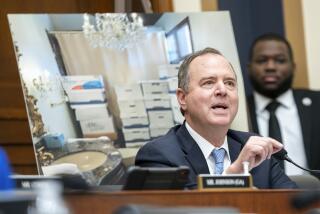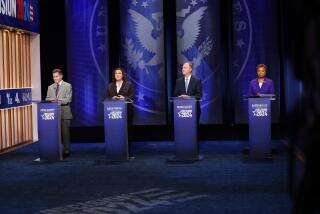Gore Asks Fellow Candidates to Avoid ‘Negative Tidbits’
- Share via
WASHINGTON — Sen. Albert Gore Jr. (D-Tenn.), declaring that other presidential candidates are feeding “negative tidbits” about their opponents to the news media, called Thursday for the Democratic presidential campaign to focus more on issues facing the country and less on “relatively trivial” matters.
Striking a similar note, Senate Majority Leader Robert C. Byrd (D-W.Va.), cautioning that constant negative campaign tactics by his party’s presidential candidates “will only bury the Democratic Party,” urged that contenders run campaigns that do not “violate the American people’s sense of fair play.”
Both Democratic leaders warned about the course of their party’s presidential campaign after the two top officials of Massachusetts Gov. Michael S. Dukakis’ campaign resigned following the disclosure of their part in supplying the news media with an “attack video” that set off a chain of events leading to Delaware Sen. Joseph R. Biden Jr.’s withdrawal from the campaign.
Video Compares Speeches
The video documented that in one of his own speeches Biden had used--without attribution--significant segments of a speech by British Labor Party leader Neil Kinnock.
Earlier, Sen. Gary Hart decided against running for the Democratic presidential nomination after the press published stories suggesting that he had spent the night in his Washington town house with Miami model Donna Rice.
Gore, in a lengthy breakfast session with The Times Washington Bureau that also dealt with a broad range of other issues, suggested that news stories of relatively trivial matters concerning the candidates have obscured campaign dialogue about important issues facing the country.
He emphasized that he differs sharply with other Democratic hopefuls in his more conservative approach to arms control and vowed during the remainder of the campaign to deliver “a series of hard-hitting messages on issues that involve differences between myself and the other five candidates in the race.”
Gore, saying his campaign may be the only one not sending out negative information, declared: “Apparently, it is politics as usual to have an agenda of little negative tidbits that are fed out.” He added that this has “created a situation where many campaigns are tempted to work up a steady diet for their contacts in the media, and this results in a whole series of stories.”
As the media plays an enormously important role in the selection of nominees and serves as a filter through which campaigns address the public, Gore said, “a lot of the campaigns have found that one of the messages that gets through that filter easily is something that is embarrassing or reflects poorly on an opponent.”
Byrd, in a Senate speech, said that, although the campaign for the 1988 Democratic presidential nomination is in its early stages, it may be time for the Democrats to adopt their own “11th Commandment” named and patterned after the unofficial GOP rule that Republicans “shall not speak ill of a fellow Republican.”
That rule was laid down by Dr. Gaylord E. Parkinson of San Diego, California state Republican chairman, just before the 1966 contest between actor Ronald Reagan and San Francisco Mayor George Christopher for the Republican gubernatorial nomination. Senior campaign aides for Vice President George Bush and Senate Minority Leader Bob Dole invoked the rule several weeks ago in agreeing not to spread rumors about each other’s candidate.
“We will never get in the front door of the White House by fighting in the gullies of the back alley,” Byrd said.
Gore and his wife, Mary Elizabeth (Tipper) Gore, an author and political activist who co-founded an organization to educate parents and consumers about sexually explicit and violent lyrical content in music, both were interviewed during The Times’ breakfast session.
The senator lashed out at four of his opponents--Dukakis, the Rev. Jesse Jackson, Missouri Rep. Richard A. Gephardt and Illinois Sen. Paul Simon--for endorsing a missile flight test ban, which he called “one of the truly bad ideas” to emerge during a debate among the candidates on national security.
‘Extremely Irresponsible’
Although he said he favored pursuing a formula for a test ban, endorsing one at this time would inject new uncertainty in a precarious balance of power between the superpowers and would be “an extremely irresponsible thing to do.”
Turning to a different campaign, Tipper Gore, author of “Raising PG Kids in an X-Rated Society,” said her drive to label explicit lyrics in records has been successful to “a certain extent.” She is also campaigning full time for her husband.
“Twenty record companies agreed to do it,” she said. “It’s a voluntary program, it is innovative. But we’ve never had this kind of problem in our society before to this extent.”
More to Read
Get the L.A. Times Politics newsletter
Deeply reported insights into legislation, politics and policy from Sacramento, Washington and beyond. In your inbox twice per week.
You may occasionally receive promotional content from the Los Angeles Times.










